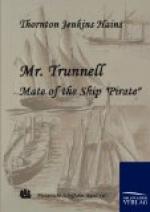Andrews gave his fierce snort and was about to say something in reply, but the third mate seized him and stopped him. The assassin was badly wounded and swayed as he stood, but his spirit was not in the least beaten. He had killed five men out of six shots from his pistol and would have had me in the list but for the knife I placed in my breast as a precaution at the warning from Chips on taking him aboard. His coolness and steadiness were marvellous. Not a shot had he wasted, and if he had been relieved a trifle sooner by his half-hearted followers, he would have had the whole crowd of us at his mercy. No man could have faced a pistol of that size in the hands of one so quick and steady.
There was no answer to my question, and I repeated it, Chips adding that they would go free if they would give up the men who had done killing.
“Why o’ course, we ain’t no pirates,” said Journegan.
“Well, chuck out your knives, or we’ll be for closing with you,” I cried. “This thing is over, and one or the other will be in command.”
“Why don’t ye take the boat an’ go clear? Dalton, here, will give ye the provisions, an’ you can get to the north’ard and make port. There ain’t no room for both of us aboard here now, even if we gave up, which we ain’t got no idea o’ doin’ unless you come out square an’ fair.”
“Yes,” said Jenks, “you men don’t want to make a Kilkenny cat go out of this ship. Do the square an’ fair thing, an’ git out. You know, Tommy,” he went on, addressing a sailor, “I don’t want to hurt you; but you know me. You boys can’t make no show agin an old man-o’-war’s man like me, as has been up to his waist in blood many a time, an’ never ware the worse for it.”
The sailor addressed spoke to me.
“Don’t you think it a good way, sir? They are good for us if they try hard, for England can whip any three of us, an’ I, for one, don’t want to run against him if it can be helped. We have a boat.”
“Nonsense,” said Chips. “We must take ’em.”
I thought a moment. There was a young girl below. Probably she was even now frightened nearly to death. If anything did go wrong with us,—and it certainly looked as if it would, when I sized up that crowd,—she would be worse than dead. There were seven of us left against six, although Andrews was too badly hurt to fear, but they were much better men physically. After they had once started to do for us, they were not the kind who would stick at anything. I was much exhausted, myself, and while I thought the matter over, it seemed as though to go were the better way out of the trouble.
Chips, however, insisted on closing with the men.
It took me some minutes to convince him that the young fellows with us were not of the kind to depend on in such a fracas, and that he would be in a bad way should he tackle England alone. Journegan, Jenks, and Dalton were all powerful men, armed with sheath-knives sharper and better than our own, for they had evidently prepared for just such an emergency.




